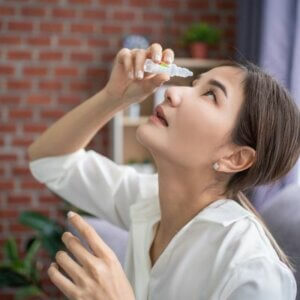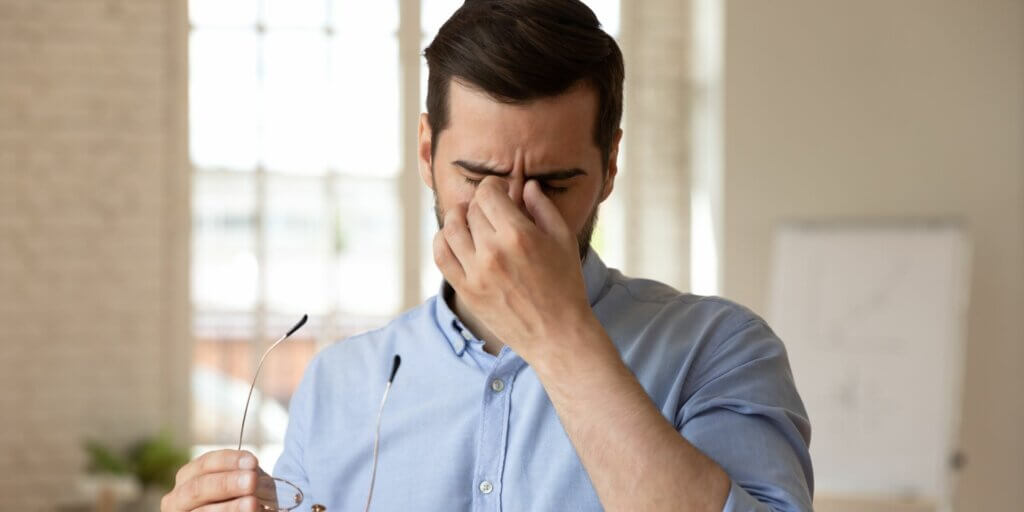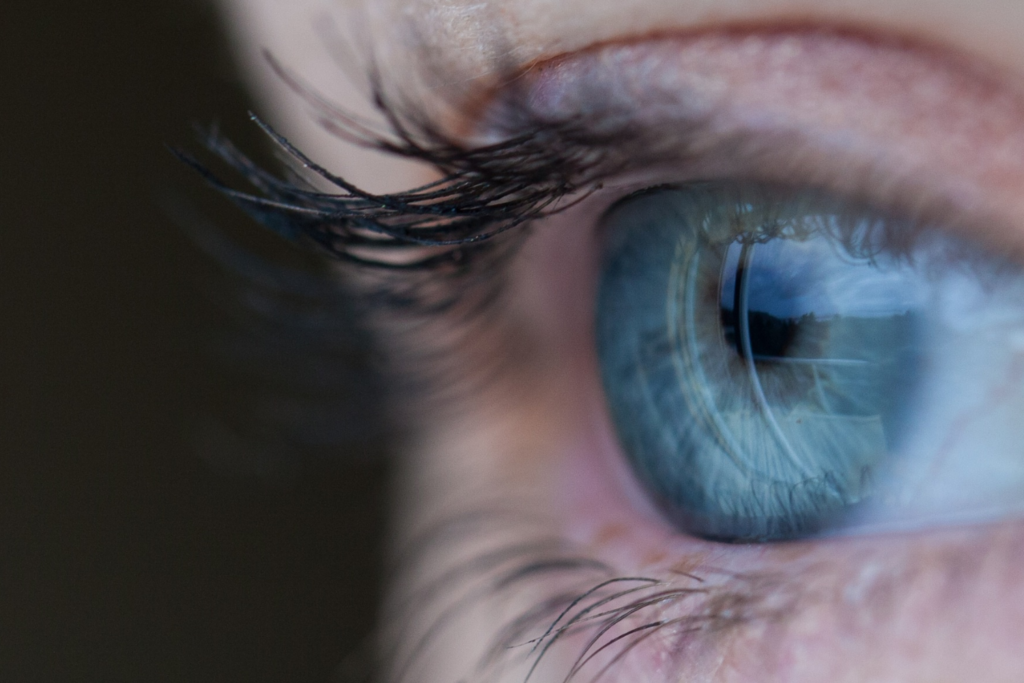Recently, Dr. Erik Sweet answered patients’ questions about dry eye during an Ask Me Anything session that we premiered on our Facebook page! We’ve written down the answers that he provided to your questions so you can reference them at any time.
What is Dry Eye?
When healthy, your eyes are covered by a normal tear film at all times. This film is made up of multiple substances from different parts of your eyes. Blinking helps spread this film across them and aids in keeping them healthy.
As Dr. Erik Sweet explains, “Dry eye disease is merely a disruption in the quantity or the quality of this tear film that normally covers the eye. It often leads to a variety of symptoms for patients which, depending on the cause, can be different from one patient to the other.”
Read our blog on dry eye syndrome to learn more!
How Do I Know If I Have Dry Eye?
When patients come into the clinic here and I’m talking to them, I can usually tell within less than a minute if they suffer from dry eye. The symptoms often tell the story. Patients will often have a variety of symptoms from dry eye that can be indicative of a dry eye disease. The most common that we see is what I call a foreign body sensation because it’s as if a foreign body is in the eye, such as an eyelash.
Other symptoms include:
- Sharp pain
- A gritty sensation in the eye
- Eyes feeling dry, sandy, or dusty
Not all patients’ eyes always feel dry. You may also experience intermittent:
- Blurry vision
- Pressure around your eyes
- Eyes that feel heavy
- Waking up with crust or mucus around your eyes
- Watery eyes
For more on diagnosing dry eye syndrome, click here!
Can You Have Watery Eyes With Dry Eye?
It surprises many people, but dry eyes and watery eyes are indeed related. This is due to the multiple components that make up your tear film, of which water is only a part. According to Dr. Sweet:
What can happen if someone has a poor oil layer or oil secretion from their eyelids is that the tears they do have can evaporate quickly and their eyes dry out. They often have a robust water response so that their body is able to make that water more quickly, thus the tearing. But the oil is not made quickly causing a poor tear film due to the oil, causing more tearing.
What Causes Dry Eye?
Dry eye is a common problem and can have a lot of different causes. However, some are more common than others. Dr. Sweet explains:
I would say the most common cause of dry eye is probably inflammation of the eyelids and the glands of the eyelids. The oil that I mentioned is produced in these glands and people can have dysfunction or inflammation of these glands so that oil is not being adequately secreted into the tear film. So while their body can produce the other parts, they don’t produce the oil, leading to dry eye.
Other common causes of dry eye are:
- Aging
- Hormonal changes
- Certain medications
- Previous eye surgeries
- Being exposed to dusty or dry air
- Autoimmune diseases
- Allergies
Allergy-related dry eye is especially common in East Tennessee. Talk to our ophthalmologists about how you can fight them.
Click here to learn more about dry eye and other vision changes as we age!
Are Over-The-Counter Eye Drops Okay To Use for Every Case of Dry Eye?
Dr. Sweet cautions patients that over-the-counter eye drops aren’t always the best solution. However, they can be a good place to start in many cases.
I often have my patients start with over-the-counter drops since they can be beneficial for mild, early, or asymptomatic dry eye. But there are some drops that can be ineffective for your particular cause of dry eye, and other drops can worsen your dry eye. It’s important to have a diagnosis and understand the underlying cause since what’s from over the counter may not be right for you.
What Are the Treatment Options for Dry Eye?
“I try to take a patient-centered, individualized approach to the treatment of dry eye,” says Dr. Sweet, “But there are some common treatments that can be implemented in a stepwise fashion.”
This includes:
- Tear-replacement eye drops
- Thicker gel eye drops
- Over-the-counter ointments
- Prescription medications
- Surgical procedures
- Serum eye drops
Treatments can vary based on efficacy and cost. Dr. Sweet and the rest of our eye surgeons treat patients based on their needs for the best results.
Does Dry Eye Require Surgery?
“Only in very rare circumstances,” answers Dr. Sweet. In most cases, surgery is used to treat another issue that includes dry eye as a symptom. This could be due to an issue such as paralysis to the ocular or eye muscles, or a problem with the eyelid that results in dry eye. With that said, he explains, “Your standard isolated dry eye typically would not require a surgical intervention.”
Advice for Dry Eyes Due To Seasonal Allergies
Dry eyes can be a major problem for those living with allergies. Unfortunately, many of the over-the-counter allergy medications can actually make them worse by reducing tear production.
On the bright side, you’re not without hope — it’s just a matter of finding the right balance. Dr. Sweet often recommends over-the-counter antihistamine drops in these situations, such as Zataditor or Pataday.
What Can Make My Dry Eye Worse?
Your environment can be a major contributor to your dry eye. As Dr. Sweet explains:
If you have dry eye and have a fan or AC going a lot then it might be time for some changes. Smoking is another factor that worsens dry eye in terms of behavior. You can also wear sunglasses outside to protect your eyes from the wind. If you’re looking at your phone a lot then you’re probably not blinking, so it’s important to take breaks to fight dryness and eye strain. This works for all types of electronic screens.
Are There Underlying Conditions That Can Lead To Dry Eye?
When most people ask this question, they’re wondering if dry eye is caused by cataracts, glaucoma, macular degeneration, or another eye problem. While they can reduce your vision, they don’t result in the pain and irritation associated with dry eye.
There are some systemic diseases that can cause dry eye. This can be hormonal changes such as menopause or autoimmune diseases. There are problems with the eyes that can mimic the dry eye symptoms without actually being dry eye. This can include uveitis, corneal ulcers or infections, or herpetic eye disease — all of which can lead to permanent vision loss. That’s why I encourage people experiencing serious problems to come in [for an appointment] to make sure it’s actually dry eye and not something more serious.
Are you having trouble managing your dry eye? Contact us today to schedule your appointment!
Baptist Eye Surgeons is an ophthalmological practice in Knoxville, TN, and Morristown, TN. Give us a call at 865-579-3920 for more information or to schedule an appointment.






